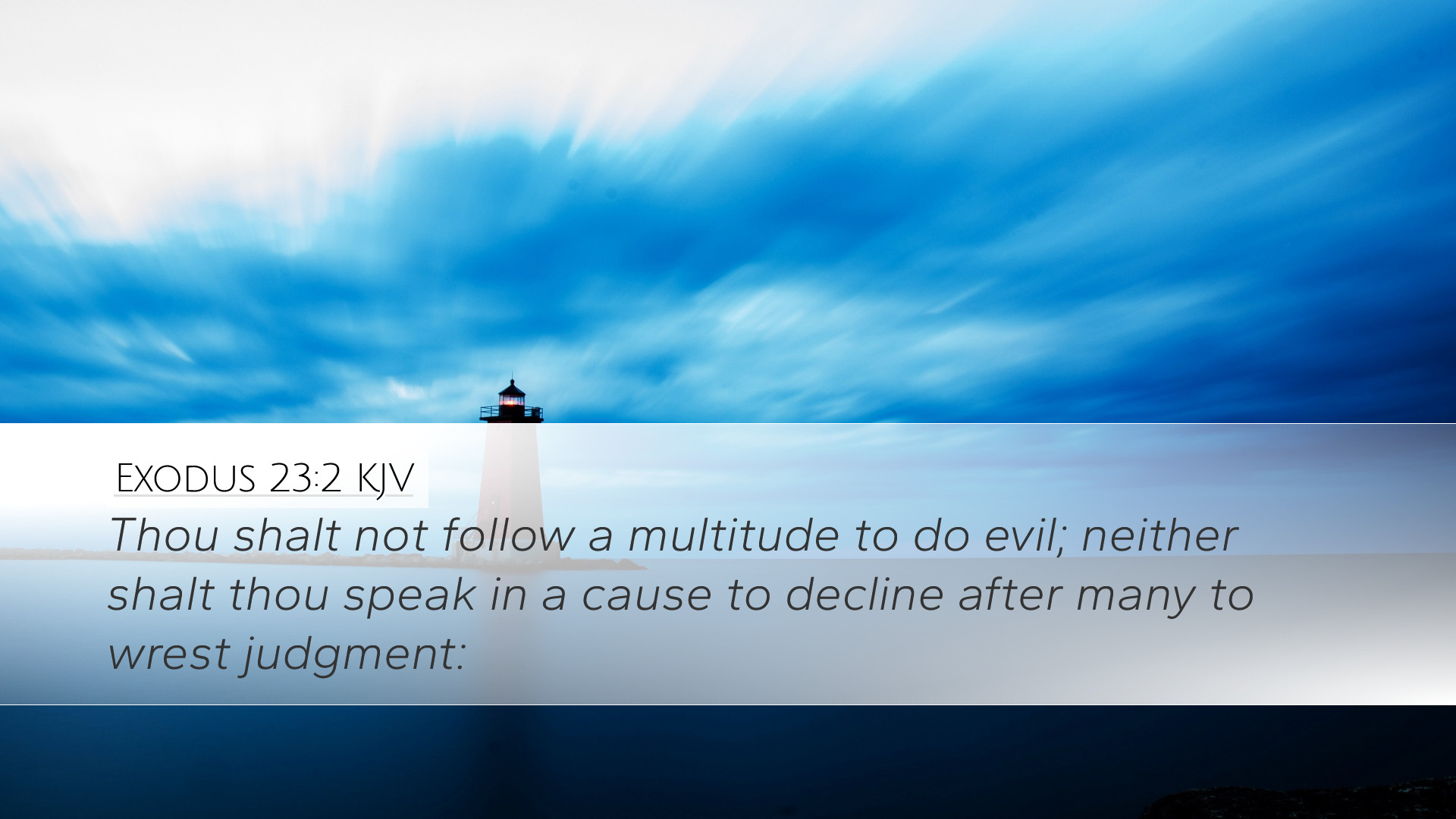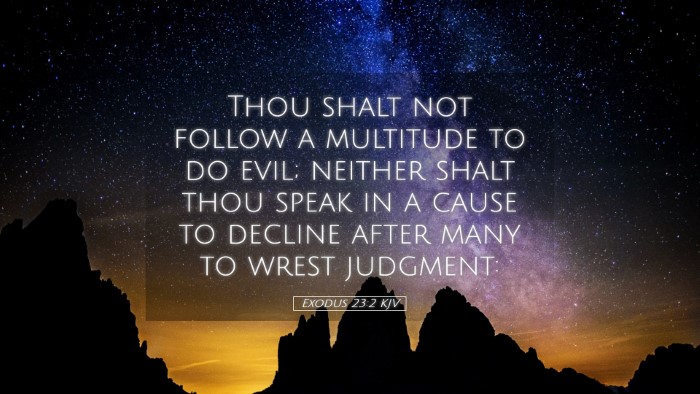Exodus 23:2 - Commentary and Insights
Verse: "You shall not follow a multitude to do evil; nor shall you testify in a dispute so as to turn aside after a multitude in order to pervert justice."
Introduction
Exodus 23:2 addresses the critical ethical principles that govern community conduct, emphasizing both personal integrity and social responsibility. This verse calls believers to uphold justice and resist the temptation to conform to the majority when they stray into wrongdoing. It is a profound reflection on the nature of righteousness, the influence of society, and the individual’s obligation to uphold truth in the face of peer pressure.
Insights from Public Domain Commentaries
Matthew Henry's Commentary
Matthew Henry articulates that this verse serves as a divine caution against the corrupting influence of public opinion. He writes that the principle here is foundational for justice: “It is not enough that we are in the right, if we are not careful to maintain it against the multitude.” Henry advises believers to be vigilant and not yield their moral responsibilities to peer pressure. He reminds the reader that conformity to the majority can often lead to abandoning the principles of justice and righteousness.
Key Themes from Henry:
- Moral Integrity: The call for individuals to uphold their moral duties regardless of public opinion.
- Independent Judgment: The importance of critical thinking and discernment in decision-making.
- Resistance to Evil: A Christian's obligation to resist the influence of collective wrongdoing.
Albert Barnes' Notes on the Bible
Albert Barnes expands on the social implications of this text, emphasizing the potential for groups to pervert justice. He highlights that “to follow a multitude to do evil is to countenance wickedness, which not only harms society but also sullies the righteous.” Barnes notes that believers are summoned to act in accordance with their conscience and the teachings of Scripture, making it clear that the individual is responsible for personal actions, irrespective of societal trends.
Key Insights from Barnes:
- Judicial Integrity: The verse emphasizes that one's testimony must be anchored in truth, especially in legal matters.
- Personal Responsibility: The individual must take ownership of their actions and resist negative group influence.
- Consequences of Complicity: Engaging in wrongful acts as part of a group leads to greater societal injustice.
Adam Clarke's Commentary
Adam Clarke interprets this command as a broader call for justice, fairness, and truthfulness. He asserts that the directive against following the multitude is particularly vital in contexts of governance and societal leadership. Clarke cautions against the dangers of aligning with the majority, noting that popularity does not equate to righteousness. He emphasizes that true justice is often at odds with popular opinion and requires courage to uphold.
Insights from Clarke:
- Justice Over Popularity: The need to prioritize truth and justice over the desire for social acceptance.
- Courage in Convictions: The importance of standing firm in one's beliefs despite societal pressure.
- Righteous Judgment: A call for leaders and individuals alike to maintain integrity in their judgments and actions.
Application for Today’s Believers
In contemporary society, where moral relativism often prevails, Exodus 23:2 serves as a timeless reminder of the importance of personal integrity and the courage to stand for justice. Pastors, students, and scholars must wrestle with the implications of this verse in their own lives and communities. Here are some applications:
Practical Applications:
- Teach Moral Responsibility: Educate congregations about the importance of standing firm in their convictions, regardless of societal trends.
- Encourage Personal Reflection: Foster an environment where individuals can assess their actions and align them with biblical principles.
- Promote Justice: Engage in community outreach and advocacy that reflects the values of truth, justice, and mercy.
- Create Strong Leadership: Encourage leaders to model integrity and ethical behavior that resists the pressures of collective wrongdoing.
Conclusion
Exodus 23:2 presents a profound challenge to individuals and communities alike. It calls for a steadfast adherence to justice and truth, coupled with a conscious choice to resist the corrupting influence of collective opinion. Through the teachings of revered commentaries such as Matthew Henry, Albert Barnes, and Adam Clarke, believers are equipped with a greater understanding of the implications of this command. As they seek to live out their faith in a complex world, may they find guidance in these timeless truths that demand both courage and integrity.


